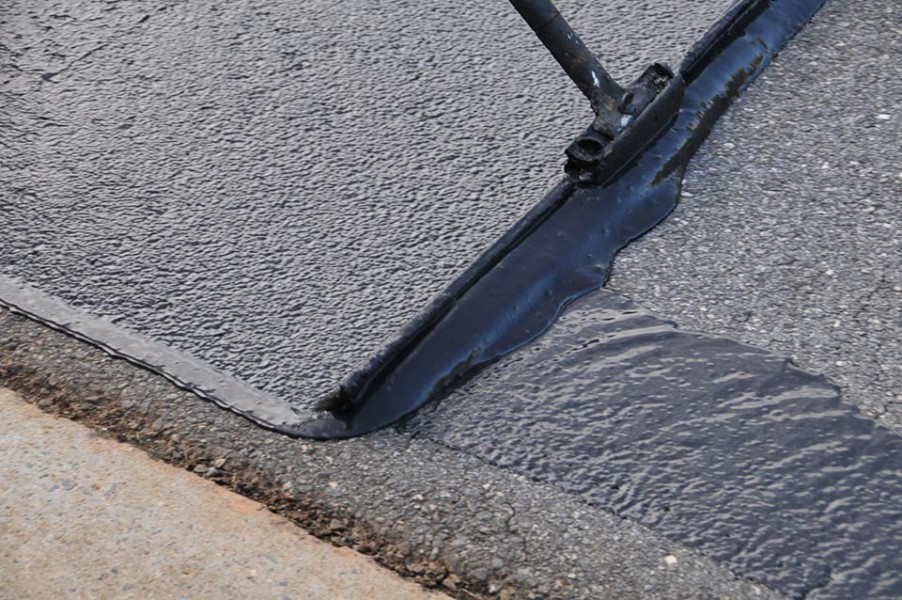Understanding Tilted Parking: How Asphalt Sealing Enhances Commercial Great Deals
Hot Mix Asphalt: A Sustainable Option for Pavement
Hot Mix Asphalt (HMA) has actually arised as a leading sustainable selection for sidewalk services, offering a myriad of ecological benefits and innovative modern technologies. As the need for environmentally friendly construction methods grows, discovering the nuances of HMA's sustainability can give useful insights right into the future of sidewalk remedies.
Ecological Benefits of Warm Mix Asphalt

Furthermore, Warm Mix Asphalt helps to mitigate urban heat island impacts. Its dark color takes in sunshine, lowering the quantity of heat showed back right into the ambience compared to lighter-colored sidewalks. This can reduce ambient temperatures in urban locations, reducing the need for cooling and eventually decreasing energy usage.
Furthermore, Hot Mix Asphalt adds to enhanced stormwater monitoring. Its porous nature allows water to infiltrate the sidewalk and reenergize groundwater products, reducing overflow and the threat of flooding. These ecological benefits make Hot Mix Asphalt a lasting option for paving roadways and highways.
Energy Performance in HMA Production
Is energy efficiency a crucial factor in the manufacturing of Warm Mix Asphalt (HMA)? Power plays a significant role in the manufacturing of HMA, affecting both cost and ecological sustainability. One essential aspect of power effectiveness in HMA production is the usage of cozy mix asphalt (WMA) modern technologies.
In addition, improvements in plant innovations have actually caused even more energy-efficient HMA production procedures. Modern plants are developed with features like recycled asphalt sidewalk (RAP) processing capacities, effective burner systems, and boosted insulation, all contributing to energy cost savings. By enhancing power use in HMA manufacturing, the market can decrease its carbon impact while preserving top quality sidewalk materials. Energy performance is, for that reason, an important factor to consider in ensuring the sustainability of Hot Mix Asphalt manufacturing.
Recyclability of Hot Mix Asphalt
The recyclability of Hot Mix Asphalt (HMA) is an essential facet of its sustainability and long-term environmental effect. HMA is just one of the most recycled materials in the United States, with over 100 million tons of recovered asphalt sidewalk (RAP) being recycled annually in new pavement building. Reusing HMA supplies several environmental benefits, such as lowering the demand for virgin materials, reducing power intake during production, and reducing the quantity of waste sent out to land fills.
The process of reusing HMA involves milling the existing sidewalk, squashing it right into smaller sized items, and blending it with brand-new aggregate and asphalt binder to develop a recycled mix. This recycled mix can frequently carry out in addition to or even much better than traditional HMA, while needing fewer raw materials and producing lower greenhouse gas exhausts. By including RAP right into brand-new sidewalk jobs, road agencies can conserve all-natural resources, minimize prices, and decrease the ecological impact of roadway building and maintenance activities. In general, the recyclability of HMA plays a significant role in advertising lasting methods within the pavement industry.

Long-Term Performance of HMA
Asphalt sidewalks demonstrate longevity and durability over an extensive period, mirroring the long-term efficiency of Warm Mix Asphalt (HMA) Furthermore, innovations in HMA innovation, such as the usage of polymer-modified binders and warm mix asphalt, have better improved the longevity and longevity of HMA sidewalks. By focusing on quality building and upkeep practices, HMA continues to confirm itself as a cost-efficient and sustainable service for durable pavement facilities.

HMA: Resilience and Sustainability
Demonstrating both toughness and sustainability, Hot Mix Asphalt (HMA) has actually ended up being a keystone in the building of long-lasting sidewalk infrastructures - hot mix asphalt. HMA's longevity originates from its capability to withstand hefty tons, harsh weather, and high traffic quantities, making it a trustworthy choice for highways, freeways, and airport runways. The structure of HMA, which generally consists of accumulations, binder, and filler, plays an important duty in improving its long life and resistance to tear and use
In addition, HMA's sustainability hinges on its recyclability Read Full Article and energy-efficient production procedure. The capacity to recycle reclaimed asphalt pavement (RAP) in brand-new HMA combinations decreases the demand for virgin products and decreases the environmental effect of sidewalk building and upkeep. Additionally, the energy efficiency of producing HMA depends on its reduced blending temperature levels compared to other pavement materials, causing lowered power consumption and greenhouse gas emissions.
Final Thought
In final thought, hot mix asphalt (HMA) offers a lasting option for sidewalk with its ecologically friendly features. HMA's recyclability, power efficiency in manufacturing, and lasting longevity make it a green selection for roadway construction.
HMA is one of the most recycled products in the United States, with over 100 million heaps of recovered asphalt pavement visit the website (RAP) being reused each year in brand-new pavement building.The process of reusing HMA entails grating the existing pavement, crushing it right into smaller items, and mixing it with brand-new accumulation and asphalt binder to create a recycled mix.Asphalt sidewalks demonstrate durability and durability over an extended duration, reflecting the lasting performance of visit this web-site Warm Mix Asphalt (HMA) Additionally, innovations in HMA modern technology, such as the use of polymer-modified binders and cozy mix asphalt, have actually even more boosted the durability and longevity of HMA sidewalks. The ability to recycle redeemed asphalt pavement (RAP) in brand-new HMA combinations decreases the need for virgin products and reduces the ecological influence of pavement building and upkeep.